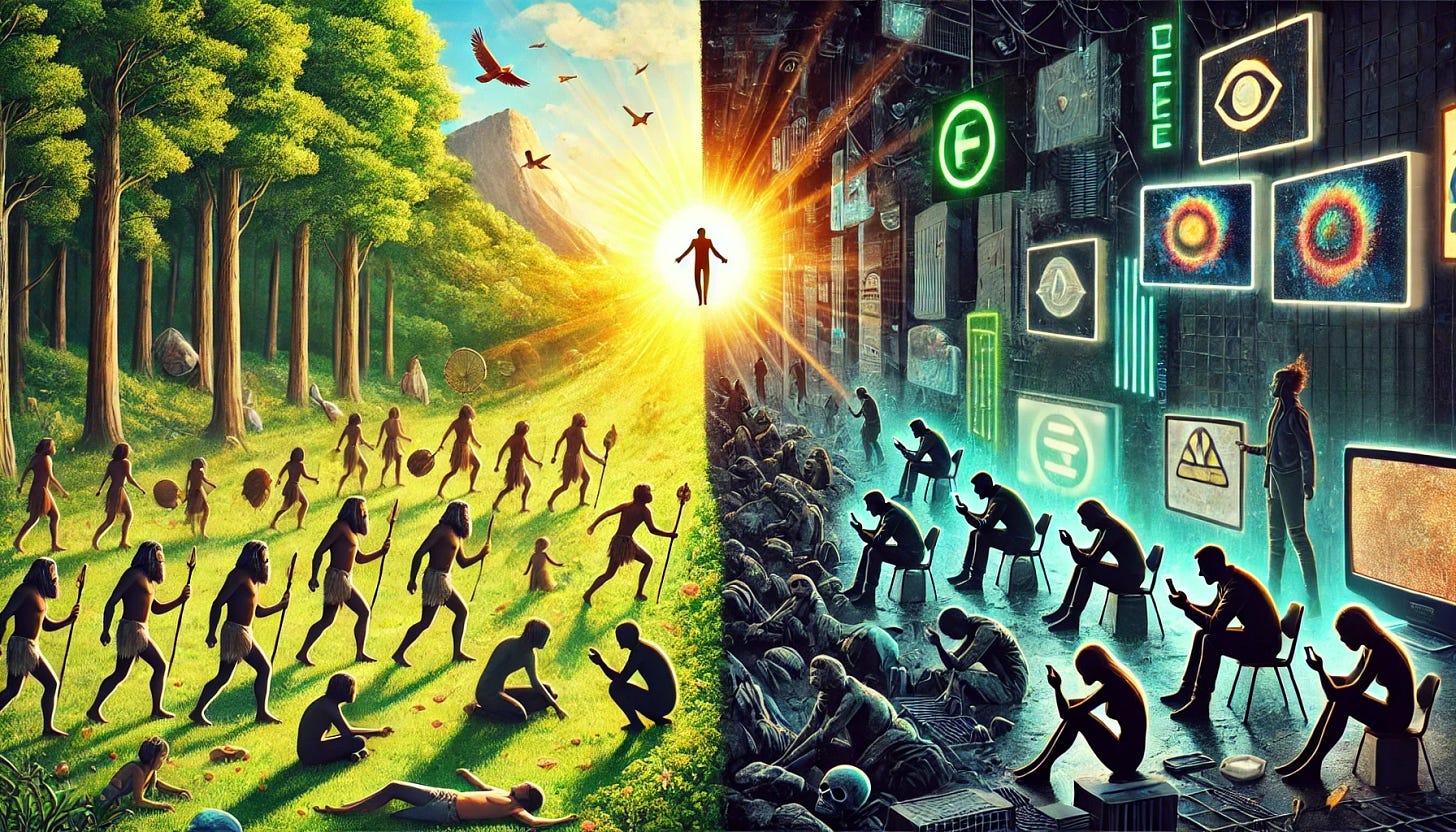Battling Abundance
Today's world creates an evolutionary mismatch we need to actively fight against.
Every Sunday, Prompted delivers insights and prompts designed to help readers become a bit better each day.
Join 600+ ambitious and thoughtful journalers by subscribing below.
The production of too many useful things results in too many useless people.
Karl Marx
Society has advanced so quickly that the main obstacle in our lives has shifted from scarcity to abundance.
Only a few generations ago, the biggest stressors in our lives were securing enough food and hoping we didn’t get sick.
In today’s world, we have an abundance of everything that was once scarce. Food, medicine, pleasure, and anything we could ever need are not just laughably accessible, but available in excess.
This shift has transformed the battles humans need to win to flourish.
We used to fight to get enough food, now we fight to limit our consumption.
We used to fight to live long enough to have kids, now we fight against boredom in our old age.
We used to fight to create meaningful leisure time, now we fight to avoid pleasure overrunning our lives entirely.
The access and abundance of everything we need (and countless things we don’t) means we’ve shifted from fighting for abundance to battling against it.
However, this shift has happened faster than our brains could adapt to our new circumstances leaving us vulnerable to the allures of abundance.
Evolutionary Mismatch
Brad Stalberg of the Growth Equation refers to the juxtaposition of our current state of abundance and our outdated brain wiring as an evolutionary mismatch.
We’re programmed for a world of scarcity, but we live in a world of abundance.
Battling today’s allures of abundance with our outdated evolutionary programming is like using a computer from the 80s to run a modern software program; it doesn’t have enough power to get the job done.
Massive food, tech, and pharma corporations further exasperate these mismatches.
Not only do we need to deal with the abundant supply of everything we ever want or need, but these corporations are also spending billions of dollars every year to engineer their products to be biochemically irresistible and bombard us with advertising encouraging us to embrace the raw impulses of our caveman brains.
Between the magnitude of evolutionary mismatches and the massive scale of today’s corporations, it’s not a fair fight, but that doesn’t mean it’s a fight we can’t win.
Winning the battle against abundance
The first thing we can do to tip the scales in our favor is recognize that we are in an unfair fight. Once we know the deck is stacked against us, we can question both our own motivations and rationale and those of the people and corporations around us.
Awareness can help us make the right choice instead of the easy choice, but the best thing we can do when presented with an unfair fight is avoid it altogether.
By definition, every time we choose to battle against chemically irresistible food or psychologically addictive content we will lose more often than we will win.
To avoid the inevitable consequences of evolutionary mismatches in our lives we should proactively identify and avoid them. If all we have is a computer from the 80s, we’re much better off playing Pong than the latest version of Call of Duty.
In today’s world avoiding these mismatches requires controlling and curating our environment to make easy choices hard and hard choices easy.
If we remove junk food from the house and make it easier to go to the gym, we even the playing field against the forces pulling us to eat junk food and sit on the couch scrolling.
The world has evolved faster than our brains creating dangerous mismatches, but if we recognize the mismatches and change our environment to eliminate them, we give ourselves the opportunity to become a bit better each day and overcome the forces pulling us in the opposite direction.
Prompts
What type of abundance are you most tempted by?
What steps can you take to avoid or eliminate what draws you towards the indulgence?
What does becoming better within this pursuit or area of life look like? How can you make that easier?
Deep Dive
Mismatch: How Our Stone Age Brain Deceives Us Every Day by Ronald Giphart and Mark van Vugt
An investigation of all the evolutionary mismatches in our lives and advice for turning mismatches into matches.
Thanks for reading! I’ll see you next Sunday.
Kevin



